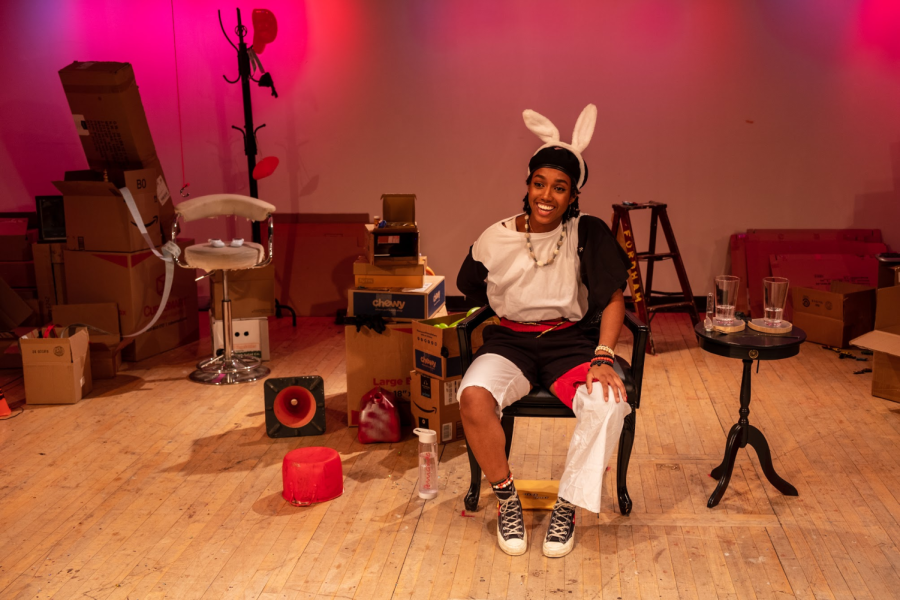White Rabbit, Red Rabbit’: Actor and Audience Descend Into Writer’s Wonderland
The structure of the theater is flipped on its head in Fordham’s adaptation of Nassim Soleimanpour’s play
April 12, 2022
The stage is a playground. In Nassim Soleimanpour’s “White Rabbit, Red Rabbit,” the lines between actor, writer and audience member become blurry. Soleimanpour creates a revolutionary theater experience where the actor becomes a vehicle of communication for him, the writer, and us, the audience.
Soleimanpour was stuck in Iran after refusing to participate in military service and tells a cautionary tale of blind obedience and adherence to societal structure through these techniques of defamiliarization.
The show is uniquely malleable, amplifying the experience and irreproducible nature of the theater.
Everyone in the theater is united in the unpredictability of the next hour.
Upon arriving at the theater, each participant that accepts a face mask declares their consent to participate in the show. Otherwise, they remain an observer.
With this, each participant receives a packet with a program and instruction sheet, granting them permission to move around pieces of the set.
After entering the rabbit-inspired carnival entrance, what was once the stage is now a playground for the audience to explore. Just some of these transferable props include boxes full of matchbox cars, old technological equipment, candy and other collectible trinkets that can be found under the couch and in hidden nooks in your childhood home.
“What I’ve been doing in this process isn’t really directing. What I see myself doing directorially is bringing together a group of people who would all be very well-suited to work in a multidisciplinary context.” Emily Hoffert, Fordham College at Lincoln Center ’22
There was such a surplus of material that the audience could not determine where the story was going, which props would become essential, and which would remain forgotten collectibles from youth. I even tried to plant a few items — an inconvenient crayon placed in a boxing glove hanging from the ceiling, a walkie-talkie placed under someone’s chair, a Staples “Easy” button down the middle row — hoping their placement would result in some involvement, even if by accident or inconvenience. Those first two actually worked out.
But even then, the props that were planted were not used as expected. Everyone in the theater is united in the unpredictability of the next hour.
The show had no run-through — no traditional rehearsal where the actors perfect their performance under the guidance of a director.
There is even no formal director, though producer and sound designer Emily Hoffert, Fordham College at Lincoln Center (FCLC) ’22, took on that role for the show as part of her directorial showcase.
“I am not a director,” she confessed. “What I’ve been doing in this process isn’t really directing. What I see myself doing directorially is bringing together a group of people who would all be very well-suited to work in a multidisciplinary context.”
Each night of the performance starred a different actor who delivers a cold read of the play and becomes familiar with its story alongside the audience watching.
It was interesting to stand before an audience with someone who also had no idea how things were supposed to go, and in these moments the audience becomes just as much a performer as the actor becomes a viewer.
The actors — Amanda Morrow, FCLC ’22; Tyler Bey, FCLC ’24; Isabella Acuña, FCLC ’25; Pedro González, FCLC ’22; and Samantha Bohrer, FCLC ’23 — all take risks as performers prohibited from practicing and perfecting their performance.
Nobody knows how the performance each night will go, how it will change or how it will stay the same. Every participant in the theater has been placed on the same equal footing.
Hoffert speaks of this project as a venture into the unknown, learning to trust the unpredictable nature of performance and finding value in the process regardless of the outcome on show nights.
The show itself is a complex story that uses allegory and weaponizes the excitement and insecurity of being completely unsure of what is going to happen next.
The script also calls for the direct involvement of the audience, reaching out to them to join the actor on stage to perform different tasks and tell various parts of the story.
As someone who indicated my consent, I was one of the first lucky few (or unlucky, depending on how well you work under pressure) to be called up to participate. I stood there with Bey as we struggled to carry out the instructions as they were written.
Coming in, Bey was told to “look for a file” and given no other instruction besides becoming familiar with his surroundings. It was interesting to stand before an audience with someone who also had no idea how things were supposed to go, and in these moments the audience becomes just as much a performer as the actor becomes a viewer.
Soleimanpour has gone to extreme lengths to keep the script confidential and exclusive to the temporal space of performance.
What makes this show so special is that it amplifies and challenges the traditional power dynamics of the theater.
Hoffert elaborates on this flip of the script, claiming, “You are never going to receive the same composition of audience members night by night. The people in the room are never the same. What I love about this show is that it really puts focus on the (ever-changing) unpredictability of theater. That hour is never coming back.”
The show itself is a complex story that uses allegory and weaponizes the excitement and insecurity of being completely unsure of what is going to happen next.
The actual content of the play I cannot divulge too much about, as Soleimanpour has gone to extreme lengths to keep the script confidential and exclusive to the temporal space of performance.
Even though this show’s run at Fordham has ended, you can see the next mainstage show debuting tonight.












